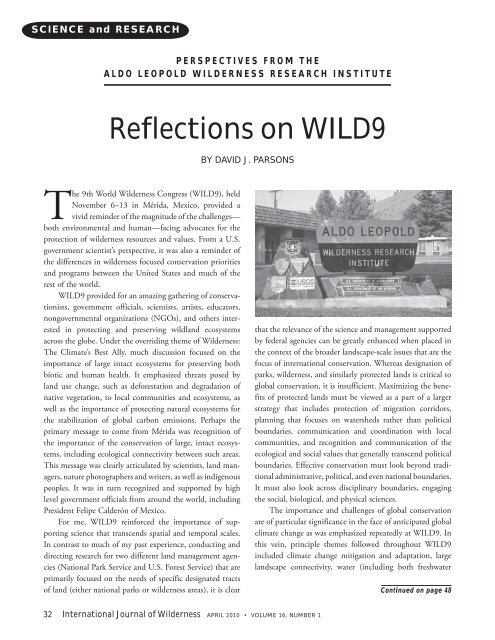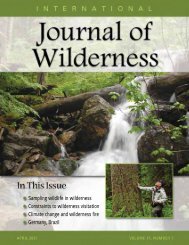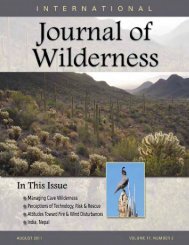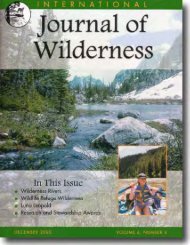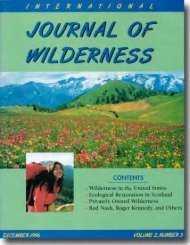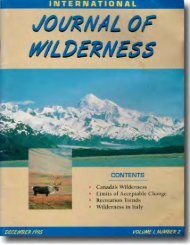Ten Tribes Reclaiming, Stewarding, and Restoring Ancestral Lands
Ten Tribes Reclaiming, Stewarding, and Restoring Ancestral Lands
Ten Tribes Reclaiming, Stewarding, and Restoring Ancestral Lands
You also want an ePaper? Increase the reach of your titles
YUMPU automatically turns print PDFs into web optimized ePapers that Google loves.
SCIENCE <strong>and</strong> RESEARCH<br />
PERSPECTIVES FROM THE<br />
ALDO LEOPOLD WILDERNESS RESEARCH INSTITUTE<br />
Reflections on WILD9<br />
The 9th World Wilderness Congress (WILD9), held<br />
November 6–13 in Mérida, Mexico, provided a<br />
vivid reminder of the magnitude of the challenges—<br />
both environmental <strong>and</strong> human—facing advocates for the<br />
protection of wilderness resources <strong>and</strong> values. From a U.S.<br />
government scientist’s perspective, it was also a reminder of<br />
the differences in wilderness focused conservation priorities<br />
<strong>and</strong> programs between the United States <strong>and</strong> much of the<br />
rest of the world.<br />
WILD9 provided for an amazing gathering of conservationists,<br />
government officials, scientists, artists, educators,<br />
nongovernmental organizations (NGOs), <strong>and</strong> others interested<br />
in protecting <strong>and</strong> preserving wildl<strong>and</strong> ecosystems<br />
across the globe. Under the overriding theme of Wilderness:<br />
The Climate’s Best Ally, much discussion focused on the<br />
importance of large intact ecosystems for preserving both<br />
biotic <strong>and</strong> human health. It emphasized threats posed by<br />
l<strong>and</strong> use change, such as deforestation <strong>and</strong> degradation of<br />
native vegetation, to local communities <strong>and</strong> ecosystems, as<br />
well as the importance of protecting natural ecosystems for<br />
the stabilization of global carbon emissions. Perhaps the<br />
primary message to come from Mérida was recognition of<br />
the importance of the conservation of large, intact ecosystems,<br />
including ecological connectivity between such areas.<br />
This message was clearly articulated by scientists, l<strong>and</strong> managers,<br />
nature photographers <strong>and</strong> writers, as well as indigenous<br />
peoples. It was in turn recognized <strong>and</strong> supported by high<br />
level government officials from around the world, including<br />
President Felipe Calderón of Mexico.<br />
For me, WILD9 reinforced the importance of supporting<br />
science that transcends spatial <strong>and</strong> temporal scales.<br />
In contrast to much of my past experience, conducting <strong>and</strong><br />
directing research for two different l<strong>and</strong> management agencies<br />
(National Park Service <strong>and</strong> U.S. Forest Service) that are<br />
primarily focused on the needs of specific designated tracts<br />
BY DAVID J. PARSONS<br />
32 International Journal of Wilderness APRIL 2010 VOLUME 16, NUMBER 1<br />
that the relevance of the science <strong>and</strong> management supported<br />
by federal agencies can be greatly enhanced when placed in<br />
the context of the broader l<strong>and</strong>scape-scale issues that are the<br />
focus of international conservation. Whereas designation of<br />
parks, wilderness, <strong>and</strong> similarly protected l<strong>and</strong>s is critical to<br />
global conservation, it is insufficient. Maximizing the benefits<br />
of protected l<strong>and</strong>s must be viewed as a part of a larger<br />
strategy that includes protection of migration corridors,<br />
planning that focuses on watersheds rather than political<br />
boundaries, communication <strong>and</strong> coordination with local<br />
communities, <strong>and</strong> recognition <strong>and</strong> communication of the<br />
ecological <strong>and</strong> social values that generally transcend political<br />
boundaries. Effective conservation must look beyond traditional<br />
administrative, political, <strong>and</strong> even national boundaries.<br />
It must also look across disciplinary boundaries, engaging<br />
the social, biological, <strong>and</strong> physical sciences.<br />
The importance <strong>and</strong> challenges of global conservation<br />
are of particular significance in the face of anticipated global<br />
climate change as was emphasized repeatedly at WILD9. In<br />
this vein, principle themes followed throughout WILD9<br />
included climate change mitigation <strong>and</strong> adaptation, large<br />
l<strong>and</strong>scape connectivity, water (including both freshwater<br />
of l<strong>and</strong> (either national parks or wilderness areas), it is clear Continued on page 48


